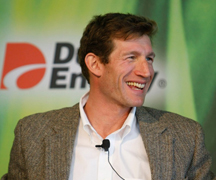 The National Climate Seminar recently hosted a conversation with Auden Schendler about his role as Vice President of Sustainability at the Aspen Skiing Company and on his new book, Getting Green Done: Hard Truths from the Front Lines of the Sustainability Revolution. In an interview with The Atlantic, Schendler was asked about his position at Aspen, “My job is to keep us in business forever.” Given the potential for climate change and warming temperatures to irreversibly affect the skiing industry, the future of the Aspen Skiing Company is uniquely linked with sustainability and our ability to address the drivers of climate change.
The National Climate Seminar recently hosted a conversation with Auden Schendler about his role as Vice President of Sustainability at the Aspen Skiing Company and on his new book, Getting Green Done: Hard Truths from the Front Lines of the Sustainability Revolution. In an interview with The Atlantic, Schendler was asked about his position at Aspen, “My job is to keep us in business forever.” Given the potential for climate change and warming temperatures to irreversibly affect the skiing industry, the future of the Aspen Skiing Company is uniquely linked with sustainability and our ability to address the drivers of climate change.
 One of the “hard truths” of sustainability that Schendler raised in the conversation is the challenge of identifying actual emissions reductions as opposed to reductions due to changes in accounting. Depending on how one calculates CO2-equivalent emissions, changes in accounting can result in drastic reductions in declared emissions. This is common place now as many businesses and institutions rush to keep up with the sustainability wave and brand themselves as green. Realizing that this phenomenon was occurring across the corporate world, education, and government prompted Schendler to write Getting Green Done.
One of the “hard truths” of sustainability that Schendler raised in the conversation is the challenge of identifying actual emissions reductions as opposed to reductions due to changes in accounting. Depending on how one calculates CO2-equivalent emissions, changes in accounting can result in drastic reductions in declared emissions. This is common place now as many businesses and institutions rush to keep up with the sustainability wave and brand themselves as green. Realizing that this phenomenon was occurring across the corporate world, education, and government prompted Schendler to write Getting Green Done.
Nowadays, we are constantly barraged with positive PR messages from diverse institutions regarding recent emissions reductions, successful implementation of green policies and how they are doing their part. A major roadblock to actually addressing climate change is people’s unwillingness to admit failure. The reality is that most places are actually failing at their carbon emissions reduction plans. Schendler said, “If we don’t start to speak honestly about the challenge of addressing climate change, we are going to fail.”

Named a global warming innovator by TIME magazine in 2006, Schendler stressed the need for large scale policy changes. Relying on individual businesses to reduce emissions isn’t going to achieve an 80% reduction in global emissions by 2050; a large scale policy change is required. Consequently, Aspen Skiing Company organized a ski industry coalition in order to lobby Congress for a price signal on carbon, most likely a tax instead of cap-and-trade. “I think cap is dead,” stated Schendler. The idea is that Congress will be more receptive to a carbon legislation lobby from the business world than from environmental groups. The reality is that carbon legislation will hurt business in the short term by making it more expensive to operate; however, it will sustain it in the long term.
When broaching sustainability issues with those in industry, Schendler initially focuses on the classic business case for implementing sustainability: it will save money, it’s good for the bottom line and the environment, and it will provide good PR. Then he follows with a more radical message, settling for a lower return rate from investments in sustainability. However, given the current economic climate, Schendler noted that a guaranteed 6-8% return on investment is looking pretty good these days. Since we need to cut emissions across the board, the current conditions are favorable for investments in sustainability and efficiency and create a window of opportunity for businesses to make serious changes.
Interested in “Getting Green Done?” Read the preface to Schendler’s book.
Join the National Climate Seminar on April 4th for a conversation entitled “The Climate for Coffee” with Paul Comey, VP of Environmental Affairs at Green Mountain Coffee Roasters. We’re rapidly cruising through the spring semester; remaining presenters for the spring include Cynthia Rosenzweig from NASA’s Goddard Institute who will talk about climate and agriculture and Jihan Gearon, Director of the Black Mesa Coalition. Call in at noon eastern on April 4th to join the conversation with Paul Comey! Call-in number: 1-712-432-3100; Conference Code: 253385. Send advance questions for Paul to [email protected]. Podcasts of the conversation with Auden Schendler and of previous NCS conversations are available here.
Attention climate leaders of the future, apply now to be part of the upcoming C2C Fellows program at Oberlin College April 6th-8th. Two graduates of this year’s C2C workshops will receive $1,000 scholarships to attend follow-on, multi-day leadership trainings, one focused on how to start a green business, and the other, on how to run your own political campaign.
